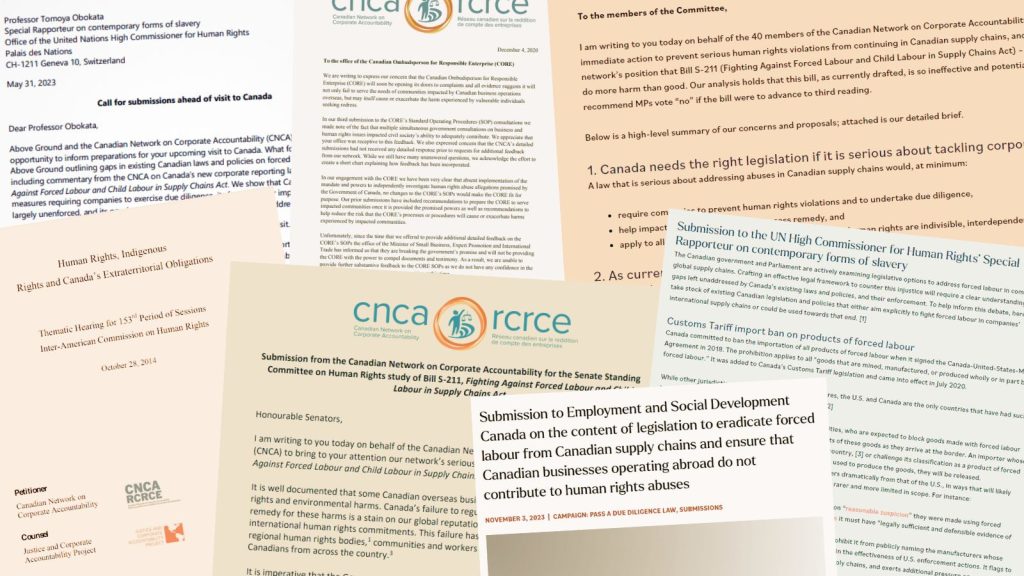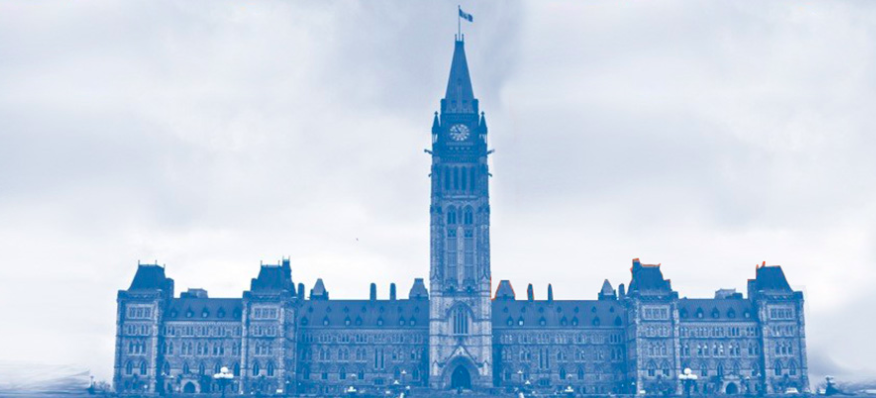Introduction
The Government of Canada has committed to introducing legislation to “eradicate forced labour from Canadian supply chains and ensure that Canadian businesses operating abroad do not contribute to human rights abuses”. Budget 2023 promised that the legislation would be introduced by 2024. In October 2023, Economic, Social Development Canada requested additional input on the content of legislation, specifically asking questions about the human rights due diligence obligations, entities covered and enforcement of the import ban.
Please note that the Canadian Network on Corporate Accountability (CNCA) and its members have previously provided the Government of Canada with extensive input on these and related issues. In addition to input provided in regular meetings with decision-makers, and supplemental information provided below, we ask you to refer to the following online documents as official annexes of this submission:
- In 2019, CNCA participated in formal stakeholder consultations with Minister Patty Hajdu and subsequently submitted consensus starting points for supply chain legislation that were endorsed by 35 Canadian civil society networks, organizations and unions.
- In 2021, CNCA released a complete model law for the Government of Canada to use as a blueprint for effective mHREDD legislation.
- In 2022, CNCA produced a comprehensive brief on the five key elements of an adequate supply chain law about which the Government of Canada requested additional input.The annex to that brief includes selected publications and input from CNCA and CNCA member organizations produced from 2017- 2022.
The CNCA was pleased to see a renewed commitment in Budget 2023 to introduce supply chain legislation by 2024. However, to be effective at protecting human rights in supply chains, that legislation must:
- require companies to prevent human rights violations and to put in place adequate human rights due diligence procedures;
- help affected people outside Canada access remedy in Canadian courts; and
- apply to all human rights.
It is urgent for Canada to respond to the widespread, well-documented evidence of human rights abuses and serious environmental damage in Canadian supply chains and global business operations.
Supplemental feedback on ESDC discussion document
CNCA provided input at the in-person full day session organized on Friday October 13, 2023. We wish to provide some additional comments in writing. They do not cover all of the input provided at the in-person session nor attempt to answer all of the discussion questions.
1. Canada’s supply chain due diligence law must absolutely be consistent with UNGPs
It is imperative that Canada’s supply chain human rights due diligence law be consistent with the United Nations Guiding Principles on Business and Human Rights. There are worrying indications in the discussion document that officials might be contemplating legislative options that would be inconsistent with the due diligence processes laid out in the United Nations Guiding Principles on Business and Human Rights.
For instance, remediation is not merely an optional action for a company in cases where they have caused or contributed to harm. Rather, it forms a crucial component of how they implement their responsibilities. This constitutes an essential aspect of the due diligence process as laid out in the UNGPs at Principle 15(c) and in the OECD Due Diligence Guidelines. Similarly, continuous engagement with stakeholders and rights-holders is fundamental to the due diligence process outlined in the UNGPs. It serves as a vital mechanism for companies to identify risks, mitigate and prevent harms and offer appropriate remedy, aligning with the principles laid out in UNGP 18.2. If these steps are made optional under the new law, then what it will be requiring of companies is not human rights due diligence, but rather a substandard risk management exercise.
The 2017 end of mission report of the United Nations Working Group on Business and Human Rights similarly integrate remediation as a core part of human rights due diligence:
“The UN Guiding Principles calls upon companies to conduct human rights due diligence to identify, mitigate and remediate adverse human rights impacts in business operations and business relationships. We heard from many stakeholders that Canada should encourage more robust human rights due diligence from extractive companies and should begin to address issues such as human trafficking/modern slavery and other human rights abuses in global supply chains. We would encourage the federal government to examine how it might use regulatory measures focused on mandatory due diligence and non-financial disclosure as means of promoting respect for human rights…” (emphasis added)
2. The evidence is crystal – clear: voluntary measures don’t work. Therefore, if you take any of the due diligence steps out they will not happen.
To date, Canada has relied almost exclusively on voluntary approaches to prevent, address and remedy serious harms. Voluntary approaches, in Canada and elsewhere, have proven on their own to be ineffective at curbing corporate abuse. Below are a few examples elucidating the point:
- A 2020 study commissioned by the European Commission established that voluntary measures have had only a limited impact.
- A 2022 report by Know the Chain “exposes the glacial rate of progress on due diligence by the world’s largest companies over the last five years. On average, the 129 companies benchmarked by KnowTheChain score a mere 29% for their human rights due diligence efforts. Key findings include:
- Over a third of benchmarked companies (36%) do not show any evidence they are assessing human rights risk in their supply chains.
- Four out of five provide no evidence they are adopting responsible purchasing practices to mitigate the risk of forced labour in their supply chains.
- A 2021 Responsible Mining Foundation report highlights that “the vast majority of companies assessed in the RMI Report 2020 show no evidence of translating their corporate commitments into action plans, thorough due diligence processes, and tracking the effectiveness of implementation. On average the set of large mining companies assessed in the RMI Report 2020 achieve a low 19% score on human rights-related issues.”
Germany’s 2011 national action plan on business and human rights sets out an expectation that companies respect human rights. However, a study commissioned by the German government found that a decade into this voluntary expectation being articulated in the country’s NAP, only 13-17% of companies were undertaking human rights due diligence procedures. This led Germany to pass a supply chain human rights due diligence law.
3. CNCA has provided a ready-to-use, credible blueprint through its model law
CNCA’s model should serve as the foundation of the government’s due diligence legislation. This model was meticulously crafted by Canadian legal experts, drawing from insights provided by subject matter experts, active engagement with rights-holders, a comprehensive study of international best practice, and is endorsed by academics, rights-holder groups, investors and Canadian civil society.
The CNCA’s model law:
- was the product of years of extensive research, outreach and input from renowned legal experts here in Canada and around the world;
- has been endorsed by 61 organizations, unions and investor groups from Canada and around the world; 150 organizations, unions and groups working with directly impacted people from 32 countries; and
- would back up the Canadian government’s long-standing “expectation” that companies respect human rights with a legal requirement to do so.
4. Recent UN special rapporteurs confirm the need to ensure due diligence obligations, access to remedy and strong enforcement measures
In 2023, two UN special rapporteurs undertook country visits to Canada: the Special Rapporteur on the rights of Indigenous peoples (UNSRRIP) and the Special Rapporteur on contemporary forms of slavery (UNSRCFS). Both concluded that Canada was failing to adequately fulfill their obligations under those conventions:
UNSRRIP (2023): The UNSR on the rights of Indigenous Peoples’ 2023 report on Canada recommends, amongst other things, that Canada should:
- “Recognize the extraterritorial human rights obligations of Canadian companies operating abroad and ensure that they are held accountable for human rights violations committed in other countries, including against Indigenous Peoples”;
- “Adopt human rights and environmental due diligence legislation to require companies to proactively prevent violations of human rights, including rights contained in the United Nations Declaration on the Rights of Indigenous Peoples”;
- “Establish mechanisms to ensure that government support to companies, including political and commercial support by embassies and financing through Export Development Canada, is conditional on respect for international human rights and environmental standards, including the Declaration”;
- “Reform the office of the Canadian Ombudsperson for Responsible Enterprise to ensure that it is fully independent, and strengthen its mandate by granting it full investigatory powers, establish effective safeguards to protect Indigenous petitioners from reprisals and create greater awareness of the mechanism”.
UNSRCFS (2023): The UN Special Rapporteur on Contemporary Forms of Slavery in his September 2023 End of Mission Report said:
“While the Special Rapporteur acknowledges these important developments, he retains some concerns over Canada’s current approach to human rights due diligence for Canadian companies. The annual reporting required under Bill S-211 can promote transparency to some extent; however, there is a risk of this becoming a box ticking exercise where companies simply submit the same statement every year, as has been reported in other jurisdictions. Self-reporting and the lack of a monitoring mechanism mean that companies could conceal or omit relevant information to protect their reputation and profits. In addition, Bill S-211 does not require Canadian businesses to implement human rights due diligence, nor implement measures to prevent, address, and remedy abuses once identified. Some interlocutors fear that Bill-211 may do more harm than good as it creates the appearance of strengthening human rights due diligence among Canadian companies without having this result in practice, and may lead to complacency in terms of introducing and implementing more robust human rights diligence, such as for example the measures outlined in Bill C-262, the Corporate Responsibility to Protect Human Rights Act.
In relation to the import ban, Canada so far has intercepted only one shipment, which was later released upon appeal. Issues like a high evidential requirement and lack of resources have been raised as obstacles, and the Special Rapporteur urges the Government to rectify these as soon as possible as he is concerned by the reports that a large amount of goods potentially produced as a result of forced labour enter into Canada unchecked. Further, although public procurement policies to end relationships with suppliers using forced labour were applied in the instance of Supermax, some interlocutors noted this was only after widespread media coverage of the issue and action by the United States.
The Special Rapporteur raised these concerns with the Government of Canada, which replied that it was currently considering a draft legislation on due diligence which aims to complement Bill S-211, though the Government would not specify whether the scope of this due diligence included human rights considerations. The Special Rapporteur regards that the imposition of mandatory human rights due diligence, with a sufficient penalty regime for non- compliance, is the way forward, and urges the Government to consider this seriously and expeditiously. In the interim, clear guidance on the reporting required under Bill S-211 and a mechanism for monitoring and oversight should be established.” (emphasis added)
Multiple UN bodies call on Canada to do more
Canada’s failure to regulate and ensure access to remedy for harms associated with Canadian business activity overseas is inconsistent with Canada’s international human rights obligations and has attracted the attention of the United Nations. For example, from 2007 to 2016, at least four United Nations treaty monitoring bodies called attention to human rights violations by Canadian extractive companies overseas and called on the Canadian government to take steps to prevent abuses and facilitate access to justice and remedy.
About the CNCA
Our network unites 41 human rights, labour, international development, environmental and faith-based organizations from across Canada that collectively represent the voices of millions of Canadians. Together we call for Canadian law and policy reform to ensure that impacted communities can access remedy in Canada if they are harmed by Canadian business activity abroad or by practices in Canadian supply chains; Canadian companies respect human rights in their global operations; and, if they are involved in abuses abroad, Canadian companies face real consequences in Canada. A link to our member list is in the Annex.
Many of our members have decades-long relationships with people who have been negatively affected by Canadian businesses abroad, especially in the extractive sector. We are subject matter experts on corporate accountability and on business and human rights. Examples of our members’ work to put an end to forced labour include Above Ground’s 2021 report Creating Consequences: Canada’s Moment to Act on Slavery in Global Supply Chains; the 2020 report by the Centre international de solidarité ouvrière on preventing forced labour in Canadian food supply chains; submissions by the Canadian Labour Congress, Amnesty International Canada and Human Rights Watch Canada to the House of Commons Subcommittee on International Human Rights’ 2017 study on child labour and modern slavery; and CNCA member interventions in the Supreme Court of Canada case involving Canadian company Nevsun Resources’ links to forced labour in Eritrea (see, for example, here and here).




